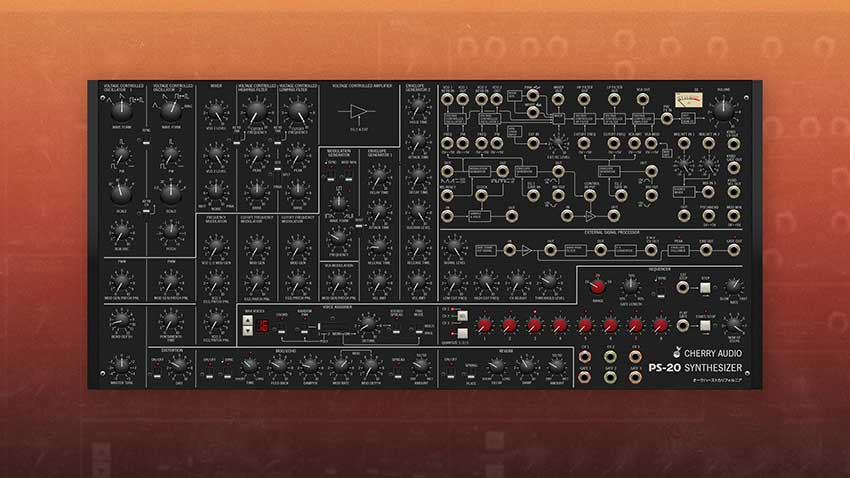
Getting Started
The Cherry Audio PS-20 is a somewhat loosely interpreted emulation of the classic Korg MS-20 analog synthesizer. We’ve carefully modeled the unique tonality of its audio path, including super-accurate emulations of its distinctly raunchy highpass and lowpass filters, but once we got started, we couldn’t stop… let’s just say we added a LOT of additional functionality to this fun and sometimes-really-weird synth.
Intended as an affordable alternative to American mono synthesizers such as the Moog Minimoog and the ARP Odyssey, the original Korg MS-20 was released in 1978, selling for less than half the price of a Minimoog. With that in mind, it’s full of design choices that are sometimes innovative, sometimes maybe dumb, and sometimes just plain off the wall. It’s important to remember that in the 70s, typical analog synth features weren’t yet completely established, so synth design was still in a sort of Wild West, or in this case, “Wild East” era.
Perhaps the most notable MS-20 feature is its grindy dual filters. In an era where the gold standard was the fat and velvety Moog ladder filter, the MS filters’ easy-to-distort, screamy resonance couldn’t have been more different. But their signature sound was the unintentional byproduct of a penny-pinching, as-few-components-as-possible design - the similarly crude low-parts-count VCA also contributed to their overdriven sound. The MS-20 wasn’t hugely popular in its day, owing to an overall smaller synth market (Japanese instruments didn’t really take off until the 80s), but as the years went on, people discovered the joys of this unique little monster, along with its baby sibling, the simplified MS-10. The MS-20 really hit its stride in the 90s when William Orbit used one all over Madonna’s “Ray Of Light” record, and people began to scoop them up. Eventually the demand became large enough that Korg reissued the MS-20, first in a miniaturized version, and eventually with full-size editions.
Beside its unique filters, the MS-20’s other famous feature is a modular-style patch panel, rarely seen in low-priced synths (well, at least in 1978). For most users, it’s something of a mixed blessing, because it appears to add full modular-synth flexibility, but unfortunately lacks a fair amount of connectivity you’d want, such as a separate oscillator outputs and modulation inputs. Overall, its implementation can be pretty confusing, even to seasoned synthesists. At a glance, the Cherry Audio PS-20 patch panel appears very similar, but in actuality, we’ve reconfigured the patch panel considerably, adding desired ins and outs for all oscillators, filters, and VCAs, correcting the confusing terminology of the original, and throwing in a few extras to make it more fun and usable.
We’ve hot-rodded the rest of the synth with extras as well - most importantly, transforming the original mono instrument into a 16-note polyphonic beast. We’ve also added a unique three-channel, eight-step sequencer with flexible CV outs, enabling control of any patch panel parameter. Rounding things out are integrated effects including a beastly distortion, modulation echo with stereo spread, and a lush digital reverb with fantastic spring and plate emulations.
As a result, the PS-20 truly is one of the most unique instruments we’ve released. Between its sometimes unpredictable filter behavior, and the tremendous flexibility of its patch panel and sequencer, the creative possibilities are endless. Throughout its development cycle, even us jaded, lifelong synth nerds kept stumbling on crazy, “how the heck did I do that?!?,” sound programming surprises. We think you’ll dig PS-20 as much as we do… enjoy!
Technical Assistance
Cherry Audio's unique online store and automatic updating should make operation a smooth experience, but if you run into any issues or have questions, you can discuss issues online at the Cherry Audio forums at:
https://forums.cherryaudio.com/viewforum.php?f=46
... or you can communicate directly with one of our surly and grumpy, scratch that... outgoing and friendly tech support staff at: